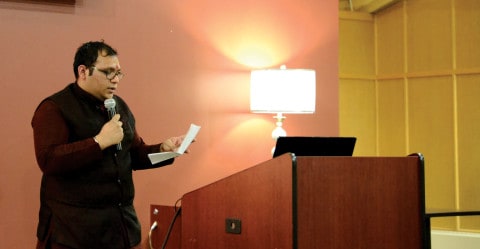While National Youth Day has been celebrated in India since 1985, for the first time ever on Jan. 15, 2016 the celebration was brought to the University of Saskatchewan, addressing questions of faith and the purpose of human existence.
The India Student Association hosted the event in honour of the special day and as a celebration of the Hindu monk Swami Vivekananda. During his lifetime, the monk was an advocate for creating better living conditions for everyone on earth and accepted all forms of faith, not only Hinduism.
The event was held in the Graduate Students’ Association Commons on campus and worked to observe Vivekananda’s achievements and ideas. Attendees were treated to two lectures, a discussion  period, a song and a screening of one of the monk’s most famous speeches.
period, a song and a screening of one of the monk’s most famous speeches.
Arnab Majumdar, ISA cultural secretary and doctoral student of physics at the U of S, speaks to the significance of this type of event.
“It’s about making the youth aware of our culture and empowering them with knowledge and making them conscious of the role of the ancient scriptures and teachings can actually play in modern life,” Majumdar said.
Students were not only exposed to intellectual conversations but were also provided with complimentary refreshments, including samosas.
While the event was focused on celebrating the life of Vivekananda, the ISA also demonstrated how society can build on ideas set forth in the past, something that the group promotes year-round.
Arnab also wanted to make it clear that the ISA is not a group only for students from India but for all students interested in Indian culture. This group throws several cultural events a year that serve to highlight the diversity and heritage that Indian culture has to offer.
Meera Kachroo, doctoral student of religious studies from McGill University, provided the second lecture of the evening.
“Education is the manifestation of the perfection already in man, and then of course humans, not just man,” Kachroo said.
Kachroo broke down the quote, explaining the belief that there is a lofty goal of perfection set out in the world of education. A common goal among university students, according to Kachroo, as everyone strives to be the best in their field.
Kachroo also went on to explain that Vivekananda did not mean to only focus on one’s own studies.
“With all of his emphasis on focus and concentration, Vivekananda was a harsh critic of only disciplinarian approaches to education. He said that the struggle to obtain outward perfection of knowledge… created nothing more than slaves who were obedient on the outside and completely hollow within,” Kachroo said.
With this as a starting point, Kachroo discussed the ideas on education that Vivekananda held, stating that purely focusing on studies could lead to becoming selfish and lonely. Instead, she encourages the idea of university education as more of a character building experience and practice in self-sufficiency.
With the event centering around the ideas and teachings of Vivekananda, there was much to cover and as part of the event, a video of the monk’s famous Chicago speech was played. In this speech to the Parliament of the World’s Religions in 1893, he not only introduced Hinduism to the world on a large scale, he also spoke on the idea of a world without religious persecution.
“Sectarianism, bigotry and it’s horrible descendant, fanaticism, have long possessed this beautiful earth. They have filled the earth with violence, drenched it often and often with human blood, destroyed civilization and sent whole nations to despair,” Vivekananda said in the video.
He goes on to advocate for the end of “all fanaticism, of all persecutions with the sword or with the pen and of all uncharitable feelings between persons wending their way to the same goal.”
According to the ISA, these ideas remain relevant within contemporary culture, centuries later.
Along with these resonating ideas, Majumdar reminds students that these kind of events hosted by the ISA are for those who wish to learn more about Indian culture, as well as for those who wish to reclaim a culture they may have left behind in order to attend university in Saskatoon.
—
Jack Thompson
Photo: Jack Thompson